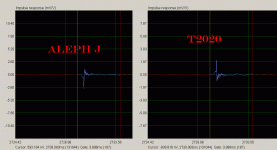input LTP , left leg - it turn phase once , then OS turn phase once
that results in same phase in-out
check your signal connection - maybe you're feeding it on "wrong" side of LTP
that results in same phase in-out
check your signal connection - maybe you're feeding it on "wrong" side of LTP
Outputs are easy to check:
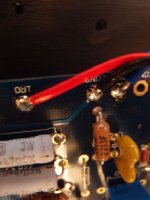

Everything seems to be OK here.
Inputs are more tricky to follow:
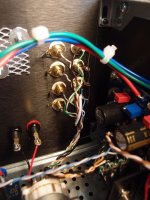
Signal is wired with Cat5 cable (coloured for right channel, white for left), ground with black wire. Everything looks fine.
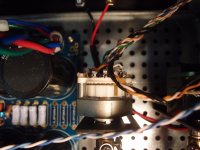
The signal cables go to the selector switch, the ground cables bypass it and go directly to the C terminal of the potentiometer, so there's no chance of inverting them here.
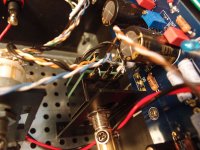
Then the signal goes from the selector to the input ("1" terminal) of the potentiometer (orange and white wires).
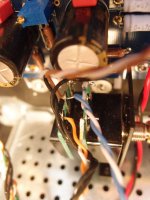
After that, the signal goes from the ouput of the pot ("2" terminal) to pcb's input (brown and blue wires).
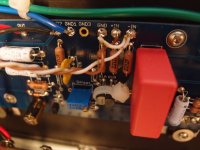
Do you see any mistake?


Everything seems to be OK here.
Inputs are more tricky to follow:

Signal is wired with Cat5 cable (coloured for right channel, white for left), ground with black wire. Everything looks fine.

The signal cables go to the selector switch, the ground cables bypass it and go directly to the C terminal of the potentiometer, so there's no chance of inverting them here.

Then the signal goes from the selector to the input ("1" terminal) of the potentiometer (orange and white wires).

After that, the signal goes from the ouput of the pot ("2" terminal) to pcb's input (brown and blue wires).

Do you see any mistake?
Last edited:
instead of wasting my old and tired eyes ....... why don't you just use continuity (beep!) function of your DMM ?

in fact , last picture is everything what's needed ; neg. input is grounded ,so everything seems ok , at least regarding wiring
look further - interconnect used etc. ......
one thing I know for sure ........ when properly made , J is non inverting

in fact , last picture is everything what's needed ; neg. input is grounded ,so everything seems ok , at least regarding wiring
look further - interconnect used etc. ......
one thing I know for sure ........ when properly made , J is non inverting
Last edited:
one thing I know for sure ........ when properly made , J is non inverting
😕 mine was inverting ... I just switched the output terminal wires to correct it.
input LTP , left leg - it turn phase once , then OS turn phase once
Oh no, you mean it's inverting phase TWICE?😀
😕 mine was inverting ... I just switched the output terminal wires to correct it.
Were any of your wires obviously mixed when measured inverted, or all was fine but one measured inverted, leading to the switch? What's the easiest way for one with minimal measurement gear, i.e. numerous multi meters, to determine this inversion?
I guess the simple way for me to ask this is: If wired correctly is their an inversion problem? Sounds like from #1522 if wired right it will be right...
Is there easy way to measure this? ( no O scope...)
Thanks!
Russellc
Last edited:
instead of wasting my old and tired eyes ....... why don't you just use continuity (beep!) function of your DMM ?
in fact , last picture is everything what's needed ; neg. input is grounded ,so everything seems ok , at least regarding wiring
look further - interconnect used etc. ......
one thing I know for sure ........ when properly made , J is non inverting
Sorry for your eyes.😱
I checked every input with a DMM; everything is OK from RCA to pcb's input. Every thing is OK from pcb's output to binding posts. Can't say waht happens between, but I don't know if there's a possibilty of mistakes in the PCB stuffing that invert phase.
Well, the measurements was made with Arta on a laptop computer with external soundcard (Miditech Audiolink 2) and a Behringer ECM8000 microphone. The interconnect was a cheap one (checked with a DMM). When I saw the result, I checked with a Populse T2020 amplifier.
I'm quite sure Arta doesn't invert phase.😀 Maybe the soundcard does, but that means the Populse does it too 'cause phase is correct with Audiolink/T2020 combo. It's possible.
Is this phase anomaly noticeable sonically like when speaker cables are out of phase with each other, no center image, diffuse stuff off to the sides with no bass?
Russellc
Russellc
No. I don't ear any difference.
By the way, I searched on the wab about that "absolute phase" thing, and lots of people (including the AES) seems to say that it is not very important.
Worse: we can't be sure that our discs were recorded "in phase" or that our CD or LP were pressed the right way. Some say they ear difference tough. Usually, on french forums, this subject turns threads into battlfields.😀
By the way, I searched on the wab about that "absolute phase" thing, and lots of people (including the AES) seems to say that it is not very important.
Worse: we can't be sure that our discs were recorded "in phase" or that our CD or LP were pressed the right way. Some say they ear difference tough. Usually, on french forums, this subject turns threads into battlfields.😀
No. I don't ear any difference.
By the way, I searched on the wab about that "absolute phase" thing, and lots of people (including the AES) seems to say that it is not very important.
Worse: we can't be sure that our discs were recorded "in phase" or that our CD or LP were pressed the right way. Some say they ear difference tough. Usually, on french forums, this subject turns threads into battlfields.😀
Phasing is very important and out of phase can result in diffused and non-directional sound. I have built two Aleph Js and never had a problem with phase inversion. I would discard all the test equipment and feed a phase check track to see if it is in phase or out of phase. Normal wiring should result in in-phase output.
Cheers.
Ok, so this is a phase thing where its flipped phase, but the flipping includes both channels, like a phase switch on my old DAC, not like one channel out of phase with the other then?
Russellc
Russellc
Phasing is very important and out of phase can result in diffused and non-directional sound. I have built two Aleph Js and never had a problem with phase inversion. I would discard all the test equipment and feed a phase check track to see if it is in phase or out of phase. Normal wiring should result in in-phase output.
Cheers.
Thanks, I have a couple of CDs and one album that provides this testing, but I think its geared more to one channel being out of phase with the other, not the amp flipping phase of both channels at the same time. Some components do flip phase....I assume thats why my old DAC had a 180 degree phase switch.
Russellc
Thanks, I have a couple of CDs and one album that provides this testing, but I think its geared more to one channel being out of phase with the other, not the amp flipping phase of both channels at the same time. Some components do flip phase....I assume thats why my old DAC had a 180 degree phase switch.
Russellc
Out of phase can happen only if one channel is out of phase. If both channels are out of phase, then they are in phase. Weird but true.
Out of phase can happen only if one channel is out of phase. If both channels are out of phase, then they are in phase. Weird but true.
Well, yes and no. What I think they are talking about above is absolute phase, like when above poster talks about albums being recorded in phase or not. Also you will see reviews of components talking about this, whether or not unit inverts phase. Or, the example I gave, the 180 degree phase switch I had on a dac. That wasn't switching one channel out of phase with the other, but flipping the absolute phase of both channels. The difference is much, much more subtle than one channel being out of phase with the other, that is clearly audible as well as noticeable soundstage wise. Some components invert absolute phase, others do not. At first, I thought the OP was talking about one channel being out of phase with the other, which is different that the "absolute phase" being discussed here.
And as mentioned above, it has caused great discussions at length. Absolute phase vs Relative phase...I'm not sure which is one channel out of phase with the other and which is the example of a component that flips phase. Not really that weird at all...
Read Mr Mcgowens response to the comments below this article
http://www.psaudio.com/pauls-posts/absolute-phase/
A little more here:
https://en.wikipedia.org/wiki/Absolute_phase
Russellc
Last edited:
Ok, so this is a phase thing where its flipped phase, but the flipping includes both channels, like a phase switch on my old DAC, not like one channel out of phase with the other then?
Russellc
Exactly.
Well, yes and no. What I think they are talking about above is absolute phase, like when above poster talks about albums being recorded in phase or not. Also you will see reviews of components talking about this, whether or not unit inverts phase. Or, the example I gave, the 180 degree phase switch I had on a dac. That wasn't switching one channel out of phase with the other, but flipping the absolute phase of both channels. The difference is much, much more subtle than one channel being out of phase with the other, that is clearly audible as well as noticeable soundstage wise. Some components invert absolute phase, others do not. At first, I thought the OP was talking about one channel being out of phase with the other, which is different that the "absolute phase" being discussed here.
And as mentioned above, it has caused great discussions at length. Absolute phase vs Relative phase...I'm not sure which is one channel out of phase with the other and which is the example of a component that flips phase. Not really that weird at all...
Read Mr Mcgowens response to the comments below this article
Absolute phase | PS Audio
A little more here:
https://en.wikipedia.org/wiki/Absolute_phase
Russellc
Thanks. Understand what you are saying. Agree.
I made a new test a few minutes ago. I made new measurements without using my soundcard (I used de headphone output of the PC). Impulse is OK with the AlephJ and upside-down with the Populse.
Conclusion: it seems that both my soundcard and the Populse amp invert phase and I made no mistakes when building my Aleph.
(Unless the integrated chipset inverts 😱😀)
Conclusion: it seems that both my soundcard and the Populse amp invert phase and I made no mistakes when building my Aleph.
(Unless the integrated chipset inverts 😱😀)
Last edited:
My understanding of whether the amp inverts phase is when the speaker should move forward it moves backwards if both channels of out of phase. I did some very limited listening both ways and I frankly could not hear the difference. I guess I am not golden eared enough. If just one speaker is out of phase then the bass cancels each other and it is easy to hear the difference, more bass in phase. It is easy enough to try, just swap your speaker leads.
- Home
- Amplifiers
- Pass Labs
- Aleph J illustrated build guide
